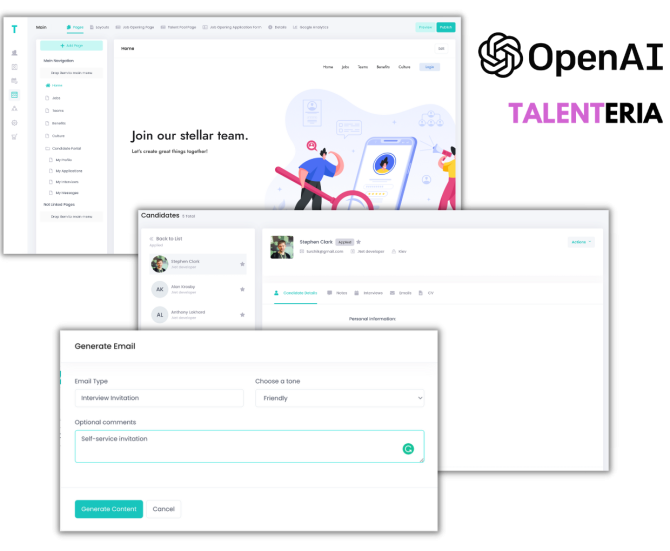
Developing a work climate that encourages coworkers to collaborate to run effectively and achieve its objectives is critical. Unfortunately, this does not happen spontaneously in most organizations, so you must make an effort and take steps to assist in developing and maintaining cooperation in the workplace.
Cooperation at work can take various forms. It refers to the extent to which employees are involved in decision-making, how management and employees collaborate to solve problems, and how all company levels collaborate to achieve common objectives.
Read on to learn about the variety of activities and initiatives that management and employees can do to increase workplace cooperation!
1. Enhance workplace culture
For coworkers to cooperate successfully, the firm's leadership must try to make cooperation one of the company's core values. Employees must see that the firm's leadership collaborates to achieve goals as a team. In addition, when teams succeed in cooperating to achieve their goals, the company's leadership must publicly recognize them.
Leaders must create a climate where people are not hesitant to express their ideas to increase teamwork truly. Leaders must foster an environment that encourages and rewards the sharing of ideas. To improve cooperation, the mission statement must emphasize teamwork and collaboration.
2. Maintain an open line of communication
Your best attempts to create a sense of belonging within a team will be in vain unless open communication is established. You may encourage this type of interaction by keeping a clear line of communication open between employees and you or other management staff. This is the only method to make sure everyone feels comfortable discussing their ideas to improve in a group.
In addition to maintaining open communication and being accessible, you should organize frequent meetings where employees can express their issues. This enables you to work to resolve problems before they can emerge, thus saving time.
3. Provide resources that are necessary to cooperate
The organization must provide the essential resources to the workgroups to improve communication. This involves providing comfortable workspaces where teams can cooperate easily. If the teams are dispersed across the country, the company must provide services such as video conferencing to collaborate remotely.
Also, the company should provide its staff with an online collaboration platform to use for internal communication. Using this platform, employees should be able to communicate effortlessly across departments using various techniques since it is a critical tool for improving cooperation.
4. Make connections between coworkers
One of the most significant aspects of workplace cooperation is the first connection phase. Employees are less willing to cooperate with strangers. Leaders should make first introductions and offer areas for employees to communicate and get to know one another, for example, by introducing new hires, revising and re-sharing organizational charts regularly, and establishing shared spaces like employee hangouts.
Employees are more likely to seek assistance from other colleagues when they know their existence and have formed a connection with them. Leaders provide a support structure and a pool of resources for their employees by functioning as social connectors.
5. Organize regular team-building exercises
One of the most effective strategies to increase cooperation skills is to host frequent team-building events. Many team-building games are intended to improve communication, delegation, problem-solving, and negotiation skills, all of which are necessary for cooperation. These activities provide attendees a common goal to strive for and need players to cooperate to achieve it. These challenges can be used to prepare for workplace partnerships.
Non-competitive team activities are also beneficial. Teammates gain a deeper understanding of one another and develop rapport through spending quality time together. Team trips and rituals are common experiences that form the basis of friendship. Simple events as team supper can promote connections among employees and boost efficiency in workplaces.
By conducting regular team-building exercises, you communicate with your employees the power of workplace cooperation and give them various opportunities to enhance their connections with coworkers.
6. Encourage a culture of learning and teaching
Employees at many effective firms rely on one another for support and opinions, and they interact with themselves rather than merely talking to the boss. Promoting learning and teaching culture is one strategy to increase coworkers' interdependence.
Employees ask each other questions and demonstrate how to complete tasks or processes in these contexts. Coworkers collaborate to develop ideas, give suggestions for each other's work, and share resources. Employees can sometimes act as mentors for one another and keep an eye on each other's work to see where they might improve.
There are numerous strategies to foster an instructional environment inside the workplace. For example, instituting a peer-review procedure in which coworkers assess work before it is forwarded to management. Alternatively, different employees can be assigned to provide informational presentations at meetings.
Managers can also make a habit of highlighting employees’ skills and recommending that other colleagues consult them on these areas of expertise. These practices legitimize peer-to-peer coaching and provide employees a greater sense of accountability over their coworkers' progress.
7. Set an example of positive cooperation
Leaders set the tone for their employees' behavior. If leaders preach cooperation but clash with colleagues, employees will likely struggle to interact effectively as well. Setting a good example for your employees by modeling positive cooperation is a fantastic thing to do.
Negative behaviors, like as gossiping or venting about other leaders, should be avoided, while positive habits, such as openly applauding colleagues, should be practiced. Rather than creating an Us versus. They approach excellent leaders to treat cooperating departments as an extension of the business.
8. Establish a platform to acknowledge colleagues
Employees are more likely to aid other coworkers who think highly of them. Facilitating peer-to-peer praise is a great method to spread compassion and thanks while also encouraging harmony and cooperation.
There are many, many ways to recognize coworkers. For example, putting a "congrats" jar in the break room for coworkers to fill with anonymous praises and reading the notes out during meetings, or incorporating a subject on a monthly self-assessment like "which coworker are you thankful for?"
9. Develop methods for resolving conflicts
Disagreements will arise with employees, and conflicts can boost cooperation if they're ready to deal with them. Leaders should devise a method for swiftly identifying and resolving conflicts among coworkers. The method should ideally be in place before any disagreements develop. Having a pre-made conflict model can help reduce delays, lower stress, and get employees back on track to achieving common goals.
Setting expectations early and proactively avoiding confrontations takes a lot of effort. Therefore, setting ground rules and clear, agreed-upon principles can increase accountability and reduce the time it takes to resolve a problem.
10. Gather feedback from employees
One of the most simple and reliable workplace cooperation strategies is to collect feedback from employees. They are a valuable source of ideas about improving the organization and are likely to have thoughts on what the problems are and how to encourage cooperation. Even if respondents don't have specific suggestions, surveys might reveal roadblocks to cooperation, such as employees’ shyness or communication barriers.
Gathering feedback from employees also conveys a message to employees that management listens to and values their opinions and gives them more control over the decision-making process.
11. Establish performance management that rewards cooperation
Nothing puts coworkers against one another like a performance-management system that only recognizes individual successes. A system that recognizes and rewards cooperation can help to reinforce a cooperative culture.
To build a cooperative culture, performance management must be collaborative and quantify cooperative behavior.
12. Motivate employees to interact outside of the workplace
Employees are focused on the duties at hand when they are in the workplace, so there is little opportunity for coworkers to bond personally. People need to get to know each other outside of the office to cooperate at the workplace.
It doesn't have to be a major outing; it might be a movie trip, a casual lunch, or a post-work drink. Participating in a social event will help break down barriers in the office and enhance cooperation by allowing coworkers to build trust and feel more comfortable collaborating.
13. Collectively celebrate achievements
Employees that work together succeed together. Celebrating personal and professional accomplishments fosters a sense of shared purpose and triumph and encourages employees to cooperate toward common goals. These celebrations can take the form of declaring achievements in meetings and receiving a standing ovation or organizing a party or outing to recognize achieving a goal.
The celebrations can be for professional achievements like getting a big account or increasing sales or personal achievements like finishing school or having a baby. Sharing happiness fosters togetherness and motivates employees to look out for one another's best interests.
Build the Best Workplace Culture With Top Talent
Cooperation in the workplace improves efficiency and employee morale, resulting in higher productivity and profitability. Use the methods listed above to promote cooperation in your workplace - but it all starts by sourcing the right talent. Talenteria offers recruitment marketing features and a career site builder, enabling you to attract and hire best-fit employees. Contact us today to learn more about what we can do for your organization.






